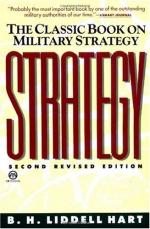
|
| Name: _________________________ | Period: ___________________ |
This quiz consists of 5 multiple choice and 5 short answer questions through Chapter 19: The Theory of Strategy.
Multiple Choice Questions
1. What was Belisarius's first major reconquest?
(a) Spain.
(b) Persia.
(c) Egypt.
(d) Rome.
2. Belisarius's legacy caused the Byzantines to adopt what military strategy for centuries?
(a) Supply-line interdiction.
(b) Defensive-offensive combinations.
(c) The indirect approach.
(d) Ship fleet strategies.
3. How does the author define "Generalship"?
(a) The dominating force of leadership of a commander.
(b) The actual directing of military forces.
(c) The chain of military command.
(d) The respect received from the troops.
4. What field of military leadership generally applies to forces smaller than armies or fleets?
(a) Diplomacy.
(b) Tactics.
(c) Strategy.
(d) Grand strategy.
5. "Limited aim" wars are most often employed by what types of military forces?
(a) Those with inferior numbers.
(b) Forces with no overall grand strategy.
(c) Modern armies.
(d) Those without real coordinated leadership.
Short Answer Questions
1. Many developed what false impression of Caesar's strategies?
2. Which general is attributed to stating and frequently reciting the famous line given in this chapter about the relative importance of the moral and the physical?
3. What was England's primary strength throughout the First World War?
4. During the British Civil Wars, what were the prospects for sweeping victories and conquests?
5. How were the Greeks able to fend off the Persian's first war against them?
|
This section contains 256 words (approx. 1 page at 300 words per page) |

|




